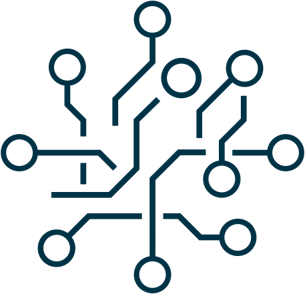GenAI is a game changer – that’s for sure. Its development has significantly simplified access to AI. It has enabled the implementation of use cases that were previously either too complex or too expensive. This democratization has triggered a true wave of partly uncoordinated projects in companies (also known as «pilotitis»), with varying degrees of success.
Key criteria for the business success of AI services
As easy as individual use cases are to implement, many projects quickly reach their limits when it comes to company-wide implementation. Silo thinking, technical complexity or AI governance issues are slowing down the transition from pilot project to scalable, sustainable solution.
No wonder that, according to a study by the Boston Consulting Group, only 26% of GenAI projects make it past the pilot stage and create lasting added value.
Experience with client projects shows that the following requirements must be met for AI services to scale and deliver the expected business benefits:

- Strategy and roadmap
Strong management commitment, clear alignment with the corporate strategy and a realistic and reliable roadmap based on validated business cases - Change management
Early involvement and constant support of all stakeholders on the AI journey, adaptation of processes, roles and responsibilities - Conversational UX
User-centric design
and ongoing optimization of dialogues based on defined personas and relevant business contexts - AI platform and integration
Selection of a flexible and scalable AI platform
that is compatible with the IT strategy and supports seamless implementation of end-to-end use cases that help automate processes and empower employees - Compliance, security, and data protection
Ensuring the integrity and security of the systems and consistent protection of personal and business-critical data through suitable security concepts and infrastructure, introducing governance for AI solutions to minimize risk and ensure quality assurance - GenAI and MLOps
Ensuring the quality, reliability and operational efficiency of AI services through systematic selection of GenAI and ML models, structured development processes, automated training and ongoing optimization of models in operation - Data
Ensuring consistently high data quality and availability through careful selection, preparation and governance of the relevant sources
Preventing «pilotitis» with a holistic approach
It is crucial to take a holistic approach to a project from the outset and to consider all important elements during implementation.
This approach should not be addressed in isolation from project to project, but should be embedded in an overarching vision and initiative. The exchange between projects should also be actively promoted in order to exploit synergies and avoid duplication.
It is just as important to look out for symptoms that indicate weaknesses in certain areas at an early stage – such as the lack of a sound business case as a strategic warning signal or the uncontrolled proliferation of tools used in the company, particularly with regard to the selection and operation of the AI infrastructure.
In this way, the AI potential can be developed step by step and sustainably throughout the company. This also averts the danger of «pilotitis», the phenomenon whereby many individual initiatives fail because they never progress beyond pilot status.
In this interview, Stéphane Mingot reveals which main challenges a company has to tackle to make AI a success and why a holistic approach is the most promising.
This article was first published in the AI Special of Netzwoche in August 2025.






